Attend Public Lecture at IPB University, Two Stanford University Professors Talk about Blue Food

Two professors from Stanford University, USA attended a public lecture at IPB University. They were Prof Jim Leape and Prof David Cohen. Both were present to give a public lecture entitled ‘Blue Food Assessment and Policy Transformation in Indonesia: Insights from Global Perspective’.
Blue food itself refers to food products that come from waters, both freshwater and sea. In line with the title of the public lecture, Prof Jim is an expert in the field of Blue Food Assessment. Prof David is an expert in the field of law and human rights.
In his presentation, Prof Jim said, “Blue Food is a shortcut to food sustainability. This is because there are many species in the water that can be used as food.” Apart from the fisheries sector, there are other sectors such as shrimp, squid, and others that can be an alternative food.
On the other hand, he highlighted the water pollution that occurs a lot today. This is because the condition can be something serious that can affect humans. In fact, according to him, species extinction may be faced due to the pollution that occurs.
“Polluted blue food is one of the problems faced recently. Water pollution is a ‘homework’ for everyone. Personal awareness is certainly needed so that pollution does not get worse. The impact will affect the health of humans who consume it,” he explained.
Furthermore, Prof David explained the importance of human role in managing ‘blue food’. According to him, sustainability will affect the economy in the future. This will make us realize that blue food will be more important in the future.
“Blue food can be the answer that food does not only depend on land-based products. In addition, blue food can open up many new jobs that will certainly affect the economy of coastal communities,” he said. (Frans/Rz) (IAAS/Hap)



